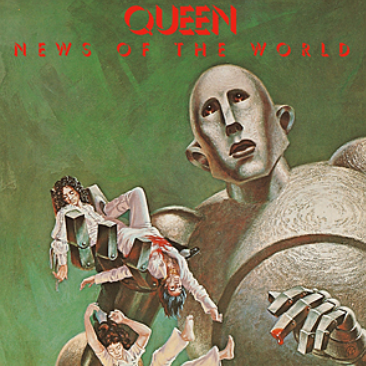45 years of “News of the World”
Queen’s sixth studio album celebrates its 45th anniversary.

Frank the robot holding the lifeless bodies of Queen members on their sixth studio album cover.
October 31, 2022
On Oct. 26, 1977, iconic English rock band Queen released their sixth studio album consisting of rock ballads, anthems, soft jazz, and foreign country influences.
Following the successful launch of their fifth studio album “A Day at the Races”, Queen members incorporated tracks that varied in style and structure on the succeeding album. Each song on the album differentiates in style due to the changing of lead vocalists, writers, and instrumental composition.
The album cover, designed by science fiction artist Frank Kelly Freas, features a reintegration of Freas’ Frank the robot with the lifeless bodies of Queen members. Other versions illustrate Frank the robot reaching towards a screaming crowd of people.
The album erupts into the iconic beat of “We Will Rock You” with its arena rock genre. Written by Queen’s guitarist Brian May in retrospect of an event during the “A Day at the Races” tour, “We Will Rock You” consists of universal lyrics and interpretations despite its direct origin. The double a-side, along with “We Are the Champions”, became anthemic household names for concerts, sports, and other entertainment events.
Peaking at number two in the UK singles charts and number four on the Billboard Hot 100 in the US upon its release, “We are the Champions” was written in 1975 but not recorded until 1977. Written by lead vocalist Freddie Mercury, the track begins with the melodic voice of Mercury accompanied by his mellow piano. The anthem then builds into the hard-hitting chorus beloved and known by many. In 2011, a group of scientific researchers dubbed “We are the Champions” as one of the catchiest songs in the world.
Following the slow tempo track of “We are the Champions”, “Sheer Heart Attack” brings an increased speed of energy and “in-your-face” lyrical and instrumentation simplicity. With it having the title of Queen’s third studio album, the track “Sheer Heart Attack” was ultimately left off the record for a number of reasons. This track is one of the few songs that does not include John Deacon on bass within Queen’s early discography. Drummer Roger Taylor embraces the roles of writing, composing, leading and backing vocals, and playing drums, bass, and rhythm guitar. Taylor also steps up for the sixth track “Fight From the Inside” which is paralleled to “Sheer Heart Attack” in the sense that both are solely written by one member.
Written and sung by May, the fourth track “All Dead, All Dead” is a sorrowful track confirmed to be written about the passing of his cat from childhood. Succeeding the track “Sheer Heart Attack”, “All Dead, All Dead” skews the album to the slower tracks of the latter half of the album.
“Sleeping on the Sidewalk” brings a more upbeat tempo and imperfect composition. May takes lead vocals yet again and utilizes an American accent throughout the blues-rock track. This track brings the band back to spontaneous flukes contrasting the desire for pinnacle perfection in all aspects of a track. On the eighth track, Deacon can be heard missing notes as well as May laughing towards the end. Every aspect of the song, excluding vocals, was recorded in one take; creating a more authentic experience with the band.
May also composed the penultimate track “It’s Late” and incorporates the guitar technique tapping which would later become more established by American musician Eddie Van Halen on Van Halen’s self-titled debut album. However, May was first inspired by Texan guitarist Rocky Athas. Treating the song with corresponding sections, May includes the tapping method in the staggering and lengthy guitar solo succeeding the bridge.
Though Decon did not participate or provide any vocals for the album, he is credited for writing “Spread Your Wings” and “Who Needs You”. Being a power ballad, “Spread Your Wings” is the first Queen single without backing vocals, despite Taylor mouthing along to the words in the music video. Mercury returns to lead vocals to illustrate a story as the narrator and motivates the protagonist, Sammy, “To spread your wings and fly away.” “Who Needs You” is composed with Spanish-influenced instruments such as guitar by May and Deacon, and maracas by May. Freddie joins the other instrumental musicians with the cowbell.
Contrasting styles of the raunchy “Get Down, Make Love” and the despairing ballad “My Melancholy Blues”, both written and sung by Mercury, “My Melancholy Blues” brings the sixth studio album to its ultimate close with simplicity as there are no backing vocals or guitar. Taylor accompanies Mercury’s piano with loose and subtle drumming, letting Mercury’s vocals be at the forefront of the ending track.
Although it is not as celebrated as other early Queen albums, their sixth studio album is exceedingly underrated and overlooked. “News of the World” includes a variety of styles that make the album dynamic and create a community of listeners across vast genres.
Listen to “News of the World” now!
![]()


